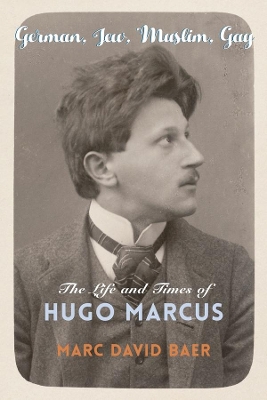Religion, Culture, and Public Life
1 primary work
Book 42
Hugo Marcus (1880–1966) was a man of many names and many identities. Born a German Jew, he converted to Islam and took the name Hamid, becoming one of the most prominent Muslims in Germany prior to World War II. He was renamed Israel by the Nazis and sent to the Sachsenhausen concentration camp before escaping to Switzerland. He was a gay man who never called himself gay but fought for homosexual rights and wrote queer fiction under the pen name Hans Alienus during his decades of exile.
In German, Jew, Muslim, Gay, Marc David Baer uses Marcus’s life and work to shed new light on a striking range of subjects, including German Jewish history and anti-Semitism, Islam in Europe, Muslim-Jewish relations, and the history of the gay rights struggle. Baer explores how Marcus created a unique synthesis of German, gay, and Muslim identity that positioned Johann Wolfgang von Goethe as an intellectual and spiritual model. Marcus’s life offers a new perspective on sexuality and on competing conceptions of gay identity in the multilayered world of interwar and postwar Europe. His unconventional story reveals new aspects of the interconnected histories of Jewish and Muslim individuals and communities, including Muslim responses to Nazism and Muslim experiences of the Holocaust. An intellectual biography of an exceptional yet little-known figure, German, Jew, Muslim, Gay illuminates the complexities of twentieth-century Europe’s religious, sexual, and cultural politics.
In German, Jew, Muslim, Gay, Marc David Baer uses Marcus’s life and work to shed new light on a striking range of subjects, including German Jewish history and anti-Semitism, Islam in Europe, Muslim-Jewish relations, and the history of the gay rights struggle. Baer explores how Marcus created a unique synthesis of German, gay, and Muslim identity that positioned Johann Wolfgang von Goethe as an intellectual and spiritual model. Marcus’s life offers a new perspective on sexuality and on competing conceptions of gay identity in the multilayered world of interwar and postwar Europe. His unconventional story reveals new aspects of the interconnected histories of Jewish and Muslim individuals and communities, including Muslim responses to Nazism and Muslim experiences of the Holocaust. An intellectual biography of an exceptional yet little-known figure, German, Jew, Muslim, Gay illuminates the complexities of twentieth-century Europe’s religious, sexual, and cultural politics.
